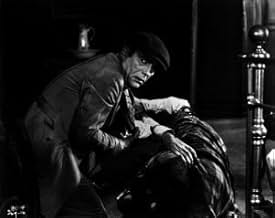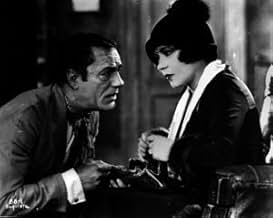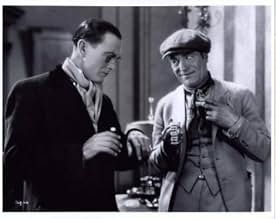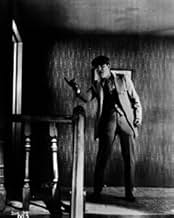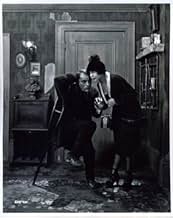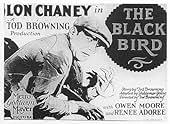Deux voleurs, le Blackbird et West End Bertie, tombent amoureux de la même fille, une artiste de boîte de nuit française dénommée Fifi. Chacun essaye de surpasser l'autre pour gagner son coe... Tout lireDeux voleurs, le Blackbird et West End Bertie, tombent amoureux de la même fille, une artiste de boîte de nuit française dénommée Fifi. Chacun essaye de surpasser l'autre pour gagner son coeur.Deux voleurs, le Blackbird et West End Bertie, tombent amoureux de la même fille, une artiste de boîte de nuit française dénommée Fifi. Chacun essaye de surpasser l'autre pour gagner son coeur.
- Réalisation
- Scénario
- Casting principal
- Récompenses
- 1 victoire au total
Andy MacLennan
- The Shadow
- (as Andy Maclennan)
Charles Avery
- Music Hall Patron
- (non crédité)
Lionel Belmore
- Music Hall Proprietor
- (non crédité)
Margaret Bert
- Minor Role
- (non crédité)
Peggy Best
- Minor Role
- (non crédité)
Louise Emmons
- Old Lady at Mission
- (non crédité)
Willie Fung
- Chinese Man
- (non crédité)
Fred Gamble
- Man Saying There's a Present for Fifi
- (non crédité)
Joseph Hazelton
- Man at Table in Music Hall
- (non crédité)
Cecil Holland
- Old Man at Mission
- (non crédité)
Bertram Johns
- Member of Bertie's Slumming Party
- (non crédité)
Avis à la une
Perhaps, one of the lesser known collaborations between Lon Chaney Sr. and director Tod Browning--"The BlackBird" has all the conventional trappings of a Chaney/Browning film; or any Chaney Sr. film now that I think about it. One of those trappings being the "love triangle" as it seems that Chaney spends a fair amount of time pining for a woman who ends up falling in love with another man.
This film also has Lon playing a double role--no elaborate makeups to disguise himself with--just the master craftsman contorting his body to play the part of the crippled "Bishop", and his nefarious brother "The Blackbird." Apparently, the Blackbird needed a cover to help hide his criminal activities and thus the part of the Bishop comes into play.
"The Blackbird" starts off a bit slow, as we the audience are introduced to all the principal characters, but picks up steam towards the end. Overall, I can see why this movie is not one of the more well-known Chaney/Browning collaborations--not that I'm saying it's bad, far from it. It's a good movie & if you're a fan of Chaney Sr. then you will definitely add this one to your collection. Now, if someone could only find a surviving print of "London After Midnight."
7 stars
This film also has Lon playing a double role--no elaborate makeups to disguise himself with--just the master craftsman contorting his body to play the part of the crippled "Bishop", and his nefarious brother "The Blackbird." Apparently, the Blackbird needed a cover to help hide his criminal activities and thus the part of the Bishop comes into play.
"The Blackbird" starts off a bit slow, as we the audience are introduced to all the principal characters, but picks up steam towards the end. Overall, I can see why this movie is not one of the more well-known Chaney/Browning collaborations--not that I'm saying it's bad, far from it. It's a good movie & if you're a fan of Chaney Sr. then you will definitely add this one to your collection. Now, if someone could only find a surviving print of "London After Midnight."
7 stars
Doctor Jekyll and Mister Hyde in a bad quarter of London : Lon Chaney plays a double role in the film and in the story, a robber (the Raven) and a man who carries about poor people (the Bishop). The way of acting is remarkable because it's a silent movie. The great thing is that the Bishop is half-paralyzed so Lon Chaney has to play the contorsionist when he moves from Raven into Bishop. The strange atmosphere is very well described with threatening faces and slumhouses.
Lon Chaney's twisted performance as the eponymous Blackbird is much fun, as he literally bends himself all out of shape to pretend himself his good, crippled brother, the Bishop. The tortuous melodrama and love triangles of the rest of the film, however, leaves much to be desired. At least, with a Chaney and Tod Browning collaboration, one is bound to be treated to something at least a little offbeat, and such is the case in "The Blackbird," although it doesn't quite reach the level of their better films, such as "The Unholy Three" (1925) and "The Unknown" (1927), although its ironic twist of fate, or double deception, anticipates the latter.
Besides Chaney's physically-demanding dual roles, there are a couple things I appreciate about this one that reinforces his performance. One is the play-within-the-play puppetry. Blackbird's love interest played by Renée Adorée is a vaudeville performer whose face is superimposed over the pliable body of the puppet, the effect not only being actually a film-within-a-film with the multiple-exposure trick--a photographic technique rather than a theatrical one--but also to mirror Chaney's physical transformations. Adorée's stage performance being explicitly a trick calls attention to the doubled deception supposedly off-stage by Chaney--that of his fooling fellow characters and that of the few moments on screen where he doesn't share the deception with the spectator. Even though the photoplay spends too much time on Chaney and the rest lounging about at the club's bar doing not much of anything and even taking time out for Blackbird to intimidate an interracial couple and for a couple of intertitles to include a racial slur against Chinese characters, I do appreciate the reflexivity of the play-within-play, or film-within-film puppetry.
The other interesting aspect is Owen Moore's character. Whereas Chaney's Blackbird/Bishop continues a charade, including going in and out of his room to change personas as if anticipating Clark Kent going into phone booths to reveal his Superman costume, to maintain his "true identity" as a lowly thief by the protection of his respectable alter ego, Moore's "West End Bertie" has completely adopted his respectable persona as a dandy while still carrying out thefts--and, more than that, he exploits the character for the purpose of stealing from his upper-class acquaintances. The love triangle stuff is bland, especially when an old lover of Blackbird's is thrown in the mix, but the initial fascination and rivalry expressed by Chaney when Moore's character is fully revealed to him is compelling.
If one gets past some particularly bad pacing and overdone melodrama for this Browning-Chaney collaboration, or that Adorée's performer turns out to be disappointingly featherbrained and Moore's monocle-wearing dandy none too interesting, either, after his initial confrontation with Chaney's Blackbird, there's clever, reflexive play going on here. On stage in the puppetry and off-stage in the criminal deception and anchored by Chaney's unparalleled bodily versatility, it's a film about characters who pretend to be something else--actors playing actors--and about the malleability and illusory quality of cinema.
Besides Chaney's physically-demanding dual roles, there are a couple things I appreciate about this one that reinforces his performance. One is the play-within-the-play puppetry. Blackbird's love interest played by Renée Adorée is a vaudeville performer whose face is superimposed over the pliable body of the puppet, the effect not only being actually a film-within-a-film with the multiple-exposure trick--a photographic technique rather than a theatrical one--but also to mirror Chaney's physical transformations. Adorée's stage performance being explicitly a trick calls attention to the doubled deception supposedly off-stage by Chaney--that of his fooling fellow characters and that of the few moments on screen where he doesn't share the deception with the spectator. Even though the photoplay spends too much time on Chaney and the rest lounging about at the club's bar doing not much of anything and even taking time out for Blackbird to intimidate an interracial couple and for a couple of intertitles to include a racial slur against Chinese characters, I do appreciate the reflexivity of the play-within-play, or film-within-film puppetry.
The other interesting aspect is Owen Moore's character. Whereas Chaney's Blackbird/Bishop continues a charade, including going in and out of his room to change personas as if anticipating Clark Kent going into phone booths to reveal his Superman costume, to maintain his "true identity" as a lowly thief by the protection of his respectable alter ego, Moore's "West End Bertie" has completely adopted his respectable persona as a dandy while still carrying out thefts--and, more than that, he exploits the character for the purpose of stealing from his upper-class acquaintances. The love triangle stuff is bland, especially when an old lover of Blackbird's is thrown in the mix, but the initial fascination and rivalry expressed by Chaney when Moore's character is fully revealed to him is compelling.
If one gets past some particularly bad pacing and overdone melodrama for this Browning-Chaney collaboration, or that Adorée's performer turns out to be disappointingly featherbrained and Moore's monocle-wearing dandy none too interesting, either, after his initial confrontation with Chaney's Blackbird, there's clever, reflexive play going on here. On stage in the puppetry and off-stage in the criminal deception and anchored by Chaney's unparalleled bodily versatility, it's a film about characters who pretend to be something else--actors playing actors--and about the malleability and illusory quality of cinema.
Lon Chaney gets to play his own evil twin in this Tod Browning crime adventure. The "Blackbird" is a low-life criminal who falls in love with Fifi, a music hall performer. Unfortunately, someone else loves her too: posh "West End Bertie," who wears a topper and a monocle like Bertie Wooster, but who's actually a crook himself, not above robbing his own friends while they're out slumming (including watching "chinkys" smoking opium).
The Blackbird and Bertie decide to become a team, but tension mounts as the Blackbird realizes that Fifi is falling for Bertie. Mixed in to the plot is the Blackbird's ex, who seems on a crusade to reform him, and his brother 'The Bishop', a helpless cripple known for his work among the poor. Blackbird and Bishop share a room but are never seen together.
The ending is tragic, as could be expected, but not without a trace of "cornball."
Browning's direction is excellent. He sets up the Limehouse location at the opening by showing a sequence of faces that evoke the atmosphere more than a mere set could do. He knew how to get the best out of Chaney, but the others in the cast also do a fine job with their facial expressions, all masterfully captured by Browning. The new score by Robert Israel, containing snippets from Chopin and others, fits the period well and never intrudes.
The Blackbird and Bertie decide to become a team, but tension mounts as the Blackbird realizes that Fifi is falling for Bertie. Mixed in to the plot is the Blackbird's ex, who seems on a crusade to reform him, and his brother 'The Bishop', a helpless cripple known for his work among the poor. Blackbird and Bishop share a room but are never seen together.
The ending is tragic, as could be expected, but not without a trace of "cornball."
Browning's direction is excellent. He sets up the Limehouse location at the opening by showing a sequence of faces that evoke the atmosphere more than a mere set could do. He knew how to get the best out of Chaney, but the others in the cast also do a fine job with their facial expressions, all masterfully captured by Browning. The new score by Robert Israel, containing snippets from Chopin and others, fits the period well and never intrudes.
If it weren't for the acting technique of LON CHANEY, here deceiving others by assuming a dual role, THE BLACKBIRD would be a lot less interesting to discuss. The plot at first promises to be intriguing, but soon becomes bogged down in a story of petty jealousy between two crooked men for the affections of a pretty girl.
OWEN MOORE is the aristocratic looking gentleman thief in love with RENEE ADOREE, as is Chaney. One of the film's saving graces are the close-ups of Chaney glowering at Moore when he realizes he's winning the heart of the girl that both of them love. Chaney uses all of his facial mannerisms in a way that makes the screen titles almost unnecessary since he tells everything with his eyes and his body movements.
But the thin plot is the culprit here. Many scenes drag on too long without sufficient reason to and the plot is ultimately a weak one by any standards. Todd Browning does get a terrific performance from Chaney, though, and that's the chief reason for watching in the first place.
The tawdry atmosphere of the Limehouse London scenes is effective but the story's ending is a weakness.
Summing up: Highly watchable for Chaney alone.
OWEN MOORE is the aristocratic looking gentleman thief in love with RENEE ADOREE, as is Chaney. One of the film's saving graces are the close-ups of Chaney glowering at Moore when he realizes he's winning the heart of the girl that both of them love. Chaney uses all of his facial mannerisms in a way that makes the screen titles almost unnecessary since he tells everything with his eyes and his body movements.
But the thin plot is the culprit here. Many scenes drag on too long without sufficient reason to and the plot is ultimately a weak one by any standards. Todd Browning does get a terrific performance from Chaney, though, and that's the chief reason for watching in the first place.
The tawdry atmosphere of the Limehouse London scenes is effective but the story's ending is a weakness.
Summing up: Highly watchable for Chaney alone.
Le saviez-vous
- AnecdotesThe Blackbird (Lon Chaney) was called The Mocking Bird in earlier versions of the film.
- Citations
Woman with Diamond Choker: I say... we are going down Plum Alley to see the Chinkies smoking.
West End Bertie: I say... shall we go?
- ConnexionsFeatured in MGM: When the Lion Roars (1992)
Meilleurs choix
Connectez-vous pour évaluer et suivre la liste de favoris afin de recevoir des recommandations personnalisées
Détails
Box-office
- Budget
- 166 000 $US (estimé)
- Durée1 heure 26 minutes
- Couleur
- Mixage
- Rapport de forme
- 1.33 : 1
Contribuer à cette page
Suggérer une modification ou ajouter du contenu manquant

Lacune principale
By what name was L'oiseau noir (1926) officially released in India in English?
Répondre

